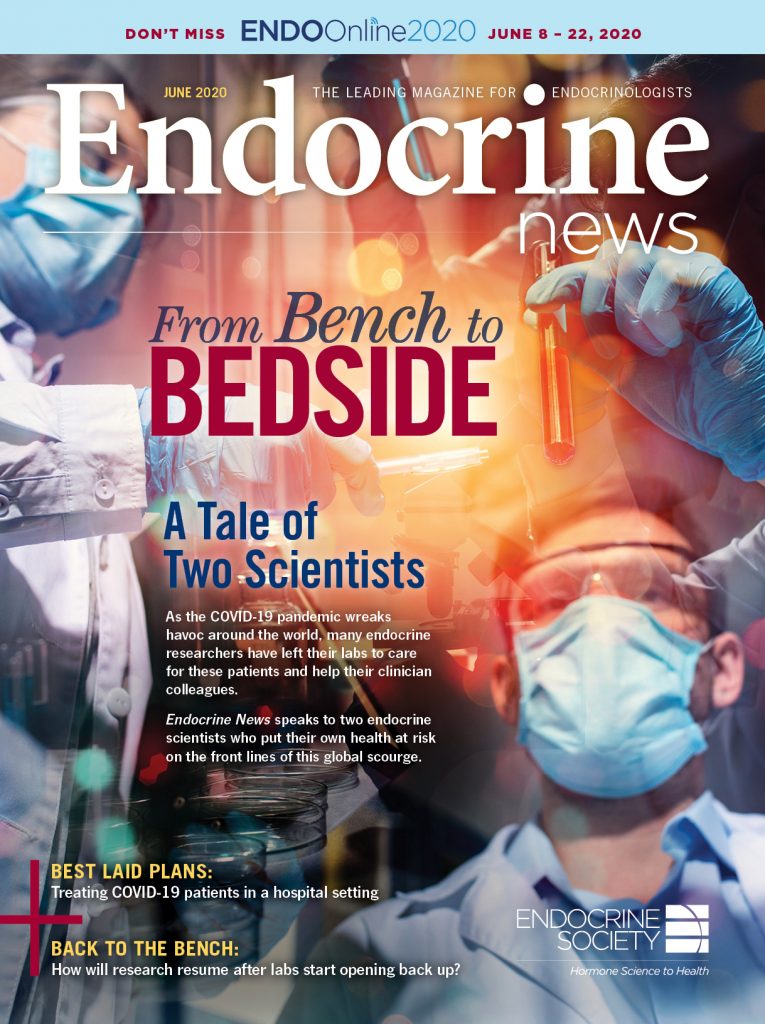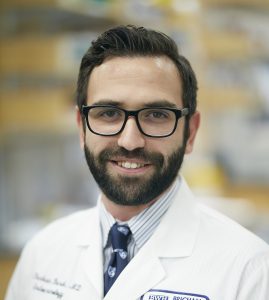
Endocrine News spoke to two early-career researchers who were called into action to treat COVID-19 patients full time. They share their inspiring stories of how they are coping with their new duties, how their research informed their patients’ care, and what they think the future of healthcare will look like post-pandemic.
Endocrine scientists routinely spend their days at the bench working to uncover the mysteries that seem to confound much of the healthcare world. Unlocking these mysteries has proven to be the key to improving human health in myriad ways. Seldom does a day in the endocrinology research lab go to waste as remarkable new discoveries evolve to change the way patients are treated around the world.
However, one thing that many researchers cannot change is the impact that the COVID-19 pandemic is having on their labs. As the virus began to spread, research labs around the world shut down, samples were stored, data was saved, and many scientists left their darkened labs not knowing when they would be able to return to their research.
But some scientists have found themselves squarely on the front lines of this pandemic, called into action to treat COVID-19 patients. Endocrine News readers learned about a couple of these scientists who left their research to treat patients in the article, “Laboratory Leaders: Talking to the 2020 Early Investigator Award Winners” by Glenda Fauntleroy Shaw in the May issue.
When asked about the effects of the pandemic on their research, all the researchers lamented the shutdown of their projects, but two added that they were now treating COVID-19 patients, suddenly thrust into new, daunting roles but eager to rise to the challenge. Domenico Trico, MD, at the University of Pisa in Italy and M. Furkan Burak, MD, of Brigham and Women’s Hospital in Boston, Mass., have put their research on hold to treat patients and come to the aid of their fellow physicians.
“As someone who has dedicated most of his training in doing research, I was enthusiastic to serve the cause, but afraid of my limited clinical experience. However, my fellow researchers and I were assigned to newly created hospital units where we received training and fundamental support by expert clinicians. After a few weeks of sharing this experience, we have all become a big family.” – Domenico Trico, MD, assistant professor of internal medicine, University of Pisa, Pisa, Italy
Leaving the Lab
Trico, currently in his first year as an assistant professor of internal medicine at the University of Pisa and a PhD candidate at the Sant’Anna School of Pisa, is a clinical scientist with a longstanding interest in diabetes and nutrition. His primary research focus is evaluating the effects of macronutrients on beta cell function and dissecting their potential pathogenetic role in type 2 diabetes development and progression in both adults and children.
At the time he started treating COVID-19 patients, he was involved in four ongoing clinical studies focusing on the effects of nutrient timing and circulating lipids on beta cell function and overall glucose homeostasis. Trico was also an attending physician in the Section of Dietology at the University Hospital of Pisa.
According to Trico, he is one of several scientists, researchers, and faculty members affected by this unprecedented action by the University Hospital of Pisa’s board to put the scientists into treatment roles. “As someone who has dedicated most of his training in doing research, I was enthusiastic to serve the cause, but afraid of my limited clinical experience,” Trico says. “However, my fellow researchers and I were assigned to newly created hospital units where we received training and fundamental support by expert clinicians. After a few weeks of sharing this experience, we have all become a big family.”
Burak, a postdoctoral research fellow at The Sabri Ülker Center for Nutrient, Genetic, and Metabolic Research, Harvard T. H. Chan School of Public Health, is also a newly appointed member of the faculty at Brigham and Women’s Hospital (BWH) and Harvard Medical School. He was set to begin his duties on July 1 after completing his three-year clinical/research endocrinology fellowship at BWH.
Burak’s research focuses on the role of fatty acid binding protein 4 (FABP4/aP2) in obesity-related immunometabolic diseases such as diabetes, fatty liver disease, and asthma. “We are developing new therapeutic strategies against those diseases using anti-FABP4 agents,” he explains. “We think that FABP4 plays a critical role in the pathogenesis of metabolically driven chronic low-grade inflammatory diseases, such as obesity, diabetes, asthma, fatty liver disease, and atherosclerosis, which share similar lipid derangements and immune-metabolic underpinnings. We are also investigating the role of FABP4 in the metabolism of immune cells, which we think may have important connection to COVID-19 immune response as well.”
For now, however, their research will have to wait. But for how long is anybody’s guess.
No “Typical” Days
Like so many of us during this pandemic, researchers have their own version of a “new normal” and had to adapt to it as quickly as possible. While some of us have now become experts in social distancing and mastering the art of virtual Zoom or Skype meetings, these scientists were now face to face with a barrage of very sick patients suffering from a virus that is still not yet fully understood.
Before the pandemic, Trico dedicated half of his time to research and teaching activities and the other half to seeing patients. “My time for clinics was mainly devoted to the care of outpatients with metabolic diseases and malnutrition, with a few monthly shifts in the hospital’s internal medicine unit,” Trico explains. “After I joined the COVID unit, my time in the hospital has substantially increased. Outpatients with urgent needs can still reach me by phone or email because I don’t want to risk passing the virus on to them in case I’m a carrier.”
Burak says that as a physician/scientist, “this lifestyle is what I have signed up for,” but admits that it is very unusual to totally shut down the lab and be re-deployed to general medicine to fight the infection on the front lines. However, in addition to being an endocrinologist, Burak is also a board-certified internist, which includes pulmonary/critical care and infectious disease management. “I feel a huge responsibility and desire to help my colleagues at the front line,” he adds.
Despite Trico’s new job on the front lines, he is still required to give online lessons and exams at the university during this time as well. “Academic activities have not been suspended, not even for clinicians caring for COVID-19 patients,” he adds.
COVID-19 Patients and Endocrine Conditions
Trico says that as he sees more and more COVID-19 patients, there are commonalities he has noticed: “Most COVID-19 patients requiring hospitalization are obese and have pre-existing medical conditions, including type 2 diabetes. Some develop glucose intolerance during hospitalization due to infection and use of steroids,” he says. “In these patients, it can be difficult to adjust the insulin to prevent the fluctuation in blood glucose levels and, most importantly, the COVID-19 infection can be harder to treat.”
As more patients are treated, Trico says that he and the other physicians and healthcare providers have become more and more aware of the importance of “nutritional support” for COVID-19 patients. “Older age and comorbidities are typically associated with malnutrition and sarcopenia, independently of BMI, which in turn can lead to worse clinical outcomes,” Trico explains. “Local guidelines for nutrition therapy in COVID-19 infections encompass oral and parenteral supplements that are individually tailored based on health status, comorbidities (e.g. diabetes or kidney failure), and disease severity.”
Burak’s endocrine consulting team is seeing an escalating number of patients with diabetes and obesity whose conditions appear to worsen the course of COVID-19 as their glycemic patterns are atypical and therefore need some adjustments. “We prioritize endocrine conditions to help manage COVID-19 treatments, which could be a lifesaver,” he says. “Insulin requirements dramatically increase in COVID-19 patients with diabetes because of insulin resistance. There are also anecdotal new diabetes cases with COVID-19 infections, which are thought to be related to direct β-cell injury/loss from viral infection. With these additional challenges and more diabetic ketoacidosis (DKA) cases, our diabetes team leaders have created new protocols for DKA management with minimal patient contact to prevent the risk of infection during treatment.”
Trico adds that the endocrinology community in Pisa has a long tradition of having several eminent endocrinologists locally, many of whom have been assigned to the same COVID-19 unit. Because of this, clinical decisions regarding patients with underlying clinical conditions can be shared among his esteemed colleagues.
“The COVID-19 era reminded researchers the importance of global collaboration and making a bigger impact by helping each other, sharing resources, opening access to confidential libraries and compounds, as well as raising awareness for more joint funding.” – M. Furkan Burak, MD, postdoctoral research fellow, The Sabri Ülker Center for Nutrient, Genetic, and Metabolic Research, Harvard T. H. Chan School of Public Health; Brigham and Women’s Hospital; Harvard Medical School, Boston, Mass.
COVID’s Lasting Impact
The COVID-19 pandemic has changed everything, from how we interact with cashiers at Target to how we handle our incoming mail and package deliveries. Nowhere have these changes been more acute than in the world of medicine. Trico says that not only will both healthcare and research will be dramatically affected by the pandemic, but social habits as well “at least until a vaccine or effective drugs are available.”
Burak feels that the pandemic has not only created new solutions to healthcare delivery — namely the advent of telemedicine — but has also created a new set of problems regarding patients delaying or ignoring treatments altogether for underlying conditions. “In general, people are avoiding on-site hospital visits, having a very high threshold to go to the emergency room, and delaying their chronic disease care such as diabetes, hypertension, heart disease, cancer treatments and imaging, and perhaps not even refilling their prescriptions as regularly,” he says. “After the COVID era, we will likely need to deal with the consequences as a medical community and potentially observe higher mortality from chronic diseases.”
Reverence for Research
As the pandemic wears on, the entire world is tenuously hanging onto the hope that a vaccine will emerge sooner rather than later, which Burak says makes it clear to the whole world that the only way to conquer this pandemic is with science and medicine.
“Researchers and medical professionals are the new heroes,” he says, adding that this will further motivate scientists, increase the impact of scientific studies, and potentially raise more funding for science. “Additionally, the COVID-19 era reminded researchers the importance of global collaboration and making a bigger impact by helping each other, sharing resources, opening access to confidential libraries and compounds, as well as raising awareness for more joint funding.”
However, Burak fears that with the spotlight shining even more brightly on the need for fast results, there could arise a harmful side-effect on scholarly publishing. “Nowadays, we start seeing articles first in New York Times before a peer review journal,” he says. “Bioarchive publishing platforms for pre-prints have become extremely popular and emerged as go-to publishers. We are facing some danger of losing the appropriate controls in research studies and only focusing on hypothesis and endpoints, of which bias might increase false results and could be misleading in many fields and eventually could damage trust.”
While their labs remain empty, Trico, Burak, and a host of scientists and researchers around the world lend their expertise and healing hands in the midst of this pandemic.
However, Trico says that research cannot remain idle for too long. “It is fundamental to conduct new research to better understand the many aspects of the transmission and pathogenesis of the new coronavirus that are still unclear,” he says. “Meanwhile, endocrinologists — and all clinicians — should be ready to switch to internal or even emergency medicine until the curve is not flattened as the waves of COVID-19 patients keep coming in to be treated.”
For his part, Burak is relying on his research background in immunometabolism which he says is very relevant tot the variable inflammatory course of COVID-19 infection. “My research about the metabolism of immune cells was warning me proactively about the worsening effect of hyperglycemia and obesity,” he explains. “Also, our research on how lipid mediators might have significant role in worsening inflammation in COVID-19 patients could be applicable in treating these patients. Currently, we are writing a grant to study details of this relationship and specifically address targeting metabolism of immune cells for treatment of COVID-19 infection.”
From a recent night shift, Burak reflected on his duties and even though he misses not being able to continue his research at the moment, he considers it an honor to help the lonely and fearful patients he has been treating during the pandemic. “When you look into their eyes, you see the fear and they are alone without any loved ones around,” he says. “We, frontline workers, are the only ones who can relieve that fear and anxiety. I feel like that is an enormous privilege.”
Newman has been the editor of Endocrine News since 2013. In the April 2020 issue, he wrote “Viral Load” detailing how Mihail Zilbermint, MD, has adjusted to the COVID-19 pandemic at Suburban Hospital in Bethesda, Md.



